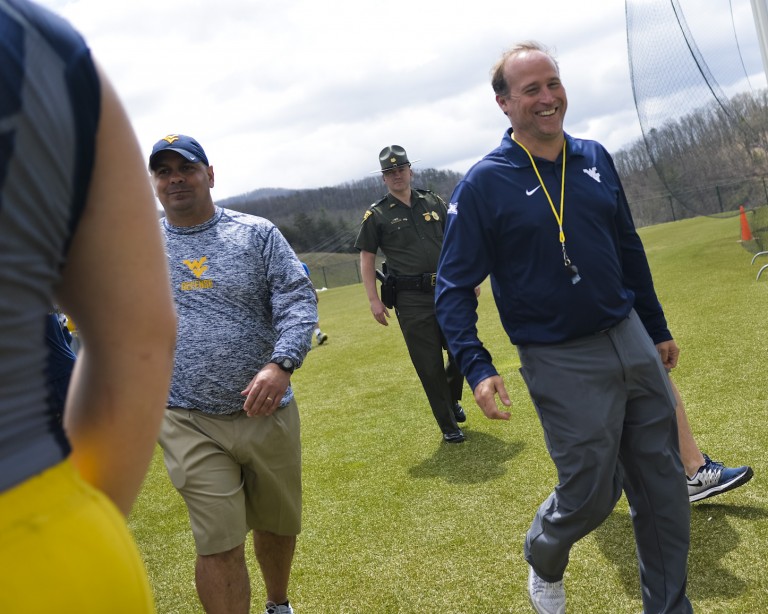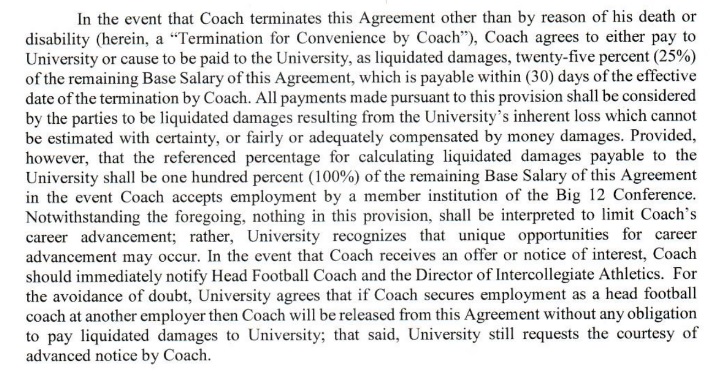Tony Gibson’s new deal
December 22, 2016 by Mike Casazza
Tony Gibson is now the second- or third-highest paid defensive coordinator in the Big 12 following yesterday’s news he’s signed a three-year contract worth $2.7 million.
A source told the Gazette-Mail Gibson will make $850,000 in 2017, $900,000 in 2018 and $950,000 in 2019. He was about to enter the final season of a three-year contract worth $2.1 million, and his 2017 salary was set to drop from $750,000 to $700,000.
“Dana and I have worked closely together on Tony’s new contract,” Director of Athletics Shane Lyons said. “It was important for us to secure Tony as our defensive coordinator for next year and beyond. Our football program has great momentum going, and we look forward to it continuing in the years to come.”
It’s the fourth amendment to his initial contract. That’s five contracts since returning before the 2013 season, and he’s going to average $900,000 a year after starting out at $250,00 in 2013. I need his agent. I’m tired of unloading the dishwasher.
We don’t know what TCU pays its assistants, because it’s a private place and doesn’t have to disclose that information to the public. The Horned Frogs have co-coordinators on offense, and let’s assume both Sonny Cumbie and Doug Meacham aren’t making Gibson Money. (It’s certainly possible, though.) Chad Glasgow was the co-defensive coordinator in 2015 and the sole coordinator in 2016. He’s been around TCU for a long time — save one brief stint when he took a spin on the carousel at Texas Tech — and he could make good money there. Let’s again say it’s not Gibson Money.
Baylor defensive coordinator Phil Bennett, believe it or not, was the highest paid offensive or defensive coordinator in the Big 12 last season. Oklahoma offensive coordinator Lincoln Riley and defensive coordinator Mike Stoops were second.
We don’t know what’s going to happen to Bennett, but he’s probably not coming back as new coach Matt Rhule’s defensive coordinator. New coordinators there could command a lot of cash for that responsibility or for their names … or they could not be worth it. New Texas coach Tom Herman brought his defensive coordinator with him, and Todd Orlando was making more than $1 million a year at Houston. Obviously, he’s not taking a pay cut, and the new offensive coordinator can expect big money, too.
On annual average, Gibson is now tied for second in the Known Salary League with Riley and Stoops and trails Orlando. One or two more people may jump in line, but Gibson and WVU are still way up there. That’s important albeit cosmetic stuff, but it’s also earned, too. Let’s not pretend Gibson isn’t deserving of good money.
(Speaking of agents…Gibson had a really unusual contract before. Not bad — to the contrary, it turns out — but just unusual. It was for three years and $2.1 million, and the salary in the third year wasn’t guaranteed if Dana Holgorsen wasn’t the coach, which is a prickly thing for assistants in the fickle world of coaching. It was a mitigating measure for WVU, which wasn’t sure what was going to happen after the 2016 season, but Gibson had that removed. What fault was it of his if he was promised money for his performance? But the salary structure never changed: $650,000 in 2015, $750,000 in 2016 and $700,000 in 2017. When it was signed, I had Someone suggest to me that, yes, that dip in the third year was clearly but also clandestinely a way for WVU to possibly save some money if a change was needed. But it was also a good move for Team Gibson in that he’d have better leverage if 2016 went well and he was seated at a table with Shane Lyons. It’s easier to argue for a raise when you’re about to take a pay cut. What’s happened now is Gibson has received a $100,000 raise every year for that pre-existing three-year contract and will make a pair of $50,000 raises in 2018 and 2019. I don’t know how Gibson pulls off another renegotiation in the future, but I also wouldn’t bet against it at this point.)
There are only a few things worth nothing further, and two are maybe marginally interesting. First, the contract again includes the offset buyout for WVU. If the Mountaineers fire Gibson, they owe him money only if he makes less at a new job than he would have made at WVU. If that’s the case, the school only owes Gibson the difference. Second, Gibson has cool incentives now, and not only are there more than before, but they are more lucrative than the old ones.
One item actually is actually kind of interesting. Gibson has a buyout!

This is new. It might be the new normal for all we know, because WVU is going to get to work on the other contacts. Every assistant but Gibson, running backs coach JaJuan Seider and offensive coordinator Joe Wickline have expiring contracts. But previously, assistants only paid WVU if they took a job without getting permission first, which is lame, and the coaches had to pay 25 percent of the remaining salary. (The stinger there is the “Don’t you dare take a job in the Big 12!” language.)
What Gibson’s contract says is he or a third party owes WVU 25 percent of what’s left if he moves to another school, with two exceptions: It’s a 100 percent fee if he stays within the Big 12 and it’s 0 percent if he gets a head coaching job. I would suspect this is going to be normal for any multi-year contracts going forward, and that’s smart. And Gibson, for the second straight offseason, was quizzed for his interest in head coaching and Power 5 coordinator jobs.

